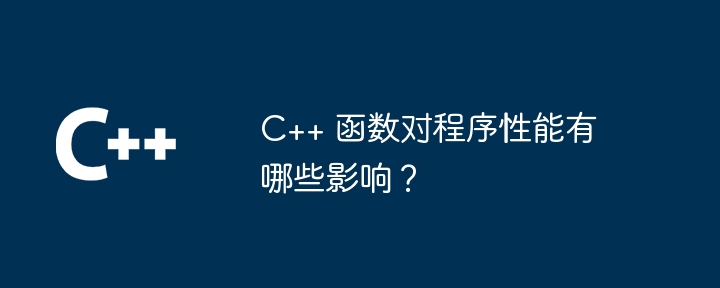
The impact of functions on C program performance includes function call overhead, local variables and object allocation overhead: Function call overhead: including stack frame allocation, parameter passing and control transfer, which has a significant impact on small functions. Local variable and object allocation overhead: A large number of local variable or object creation and destruction can cause stack overflow and performance degradation.

The impact of C functions on program performance
Introduction
The function is C Code blocks that encapsulate functionality and data together, which facilitate modularization and code reuse. However, the use of functions can also have a significant impact on program performance. This article will explore the impact of functions on program performance and how to optimize functions to maximize efficiency.
Function call overhead
Every time a function is called, the following overhead is involved:
These overheads may significantly increase the execution time of small functions.
Practical case
Suppose we have a recursive function to calculate the Fibonacci sequence:
int fib(int n) {
if (n == 0 || n == 1) {
return n;
}
return fib(n - 1) + fib(n - 2);
}The recursive call of this function will result in a stack frame Repeated allocation and deallocation, resulting in high overhead.
Optimize function performance
The following are some techniques for optimizing function performance:
inline keyword. Local variables and objects
Local variables and objects are allocated on the stack during function calls. The creation and destruction of a large number of local variables or objects can lead to stack overflow and performance degradation.
Practical case
Suppose we have a function to allocate a string array:
void createStringArray(int size) {
string *array = new string[size];
// ...
}Allocating large size arrays will result in a large number of stack allocations, This slows down function execution.
Optimize local variables and objects
std::unique_ptr and std::shared_ptr to manage objects to avoid memory leaks and stack overflows. By applying these optimization techniques, you can significantly improve the performance of your C programs.
The above is the detailed content of What impact do C++ functions have on program performance?. For more information, please follow other related articles on the PHP Chinese website!
 How to solve Java stack overflow exception
How to solve Java stack overflow exception
 String array assignment method
String array assignment method
 What are the differences between c++ and c language
What are the differences between c++ and c language
 Recommended learning order for c++ and python
Recommended learning order for c++ and python
 Cost-effectiveness analysis of learning python and c++
Cost-effectiveness analysis of learning python and c++
 Is c language the same as c++?
Is c language the same as c++?
 Which is better to learn first, c language or c++?
Which is better to learn first, c language or c++?
 The difference and connection between c language and c++
The difference and connection between c language and c++




